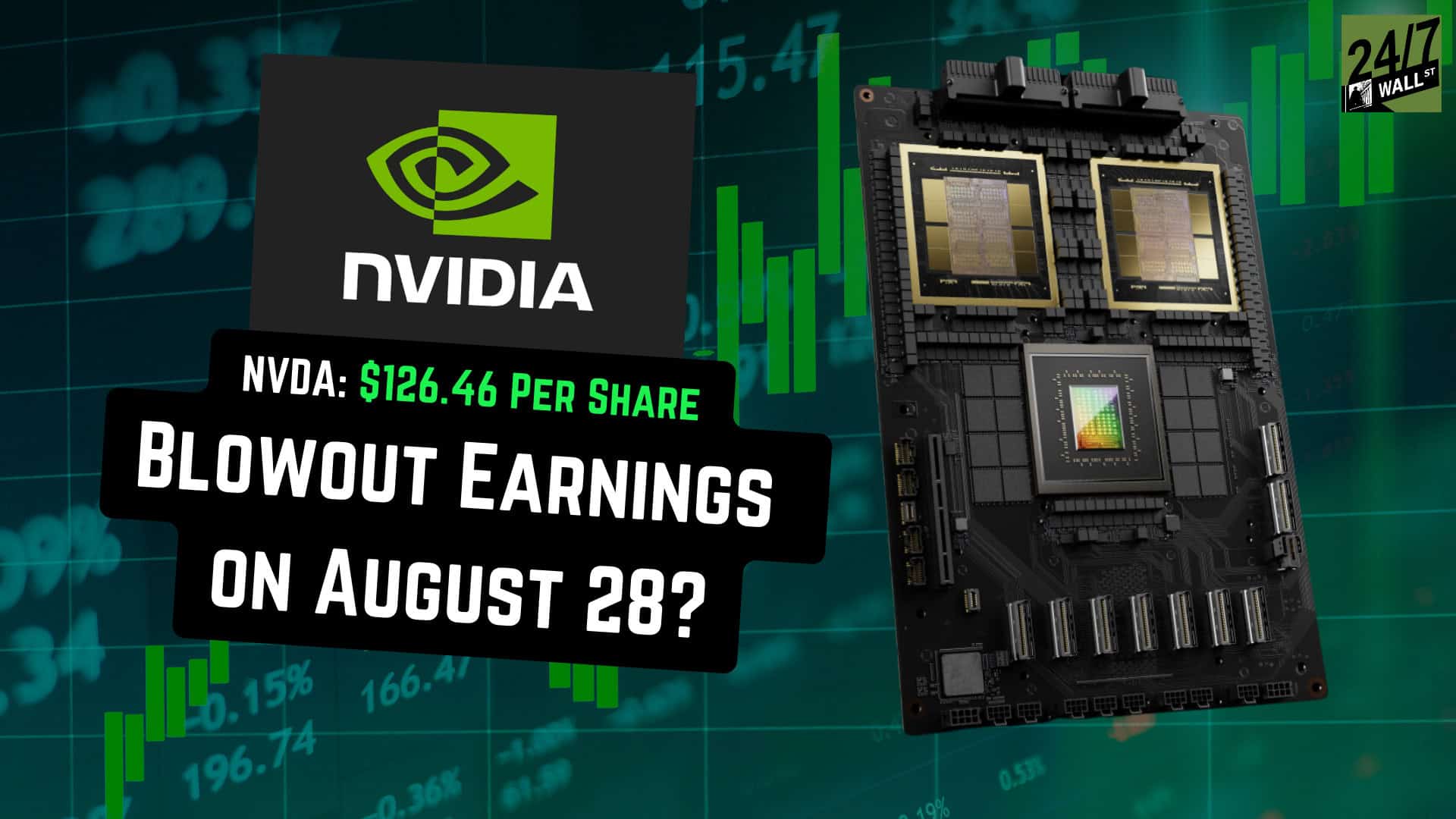Investing
Here's the Number NVIDIA Needs to Blowout Earnings on August 28

Published:
Last Updated:

And here we go.
NVIDIA (Nasdaq: NVDA) reports earnings after the bell on Wednesday, August 28th. It will be the most widely followed release of the whole earnings season and will impact dozens of companies across the artificial intelligence space. So, you might be wondering just what number NVIDIA could report that would send its – and dozens of other AI companies – share prices soaring.
Let’s break down how NVIDIA has performed relative to expectations in recent earnings and what kind of numbers they’d need to report to blowout earnings on August 28th.
The current era of NVIDIA began with the company’s earnings release in April 2023.
Before that release the company had beaten revenue expectations by .53% in the January 2023 quarter, 1.92% the quarter before that, and hadn’t beaten revenue by more than 10% since its blowout quarter in April 2018.
| Earnings (Date is End of Fiscal Quarter) | Revenue | Revenue Versus Wall Street Expectations | Earnings Per Share (Adjusted) | Earnings Per Share vs. Expectations | Share Price Reaction the Next Day |
| April 2023 | $7.192 Billion | 10.26% | $.11 | 22.22% | 24.4% |
| July 2023 | $13.507 Billion | 21.87% | $.27 | 28.57% | .1% |
| October 2023 | $18.12 Billion | 12.47% | $.40 | 17.65% | -2.5% |
| January 2024 | $22.10 Billion | 7.57% | $.52 | 13.04% | 16.4% |
| April 2024 | $26.04 Billion | 6.04% | $.61 | 8.93% | 9.3% |
| July 2024 (Reported This Wednesday) | $28.73 Billion (Estimate) | To Be Determined | $.64 (Estimate) | To Be Determined | TBD |
All data from the table above compliments of S&P Capital IQ.
Yet, after beating revenue expectations by 10.26% last April quarter, NVIDIA beat sales estimates by 21.87% in July and 12.47% in October. This series of earnings ‘beats’ kicked off NVIDIA’s generational stock run.

As you can see from the numbers above, the size of NVIDIA’s ‘surprises’ above Wall Street expectations has been shrinking. This isn’t necessarily due to worse performance. When NVIDIA beat Wall Street’s sales expectations by 21.87% in the July quarter last year, it grew sales 101.5% from the prior year.
In the prior quarter (April 2024), NVIDIA ‘only’ beat Wall Street’s sales estimates by 6.04%, but grew sales by 262.1%. This is to say, Wall Street has just gotten ‘better’ at predicting the eye-popping numbers NVIDIA is reporting during the artificial intelligence boom.
Finally, you can see from the column displaying share price reaction the day after earnings, several factors go into NVIDIA’s performance after earnings. This includes how much NVIDIA has ‘run up’ headed into earnings, how much institutional investors may have expected beyond Wall Street’s published estimates (the whisper number), and NVIDIA’s forward guidance for the quarter ahead.
Earnings releases also help set up the company’s performance beyond just the next day after earnings. A great earnings report will lead to weeks of ‘upgrades’ and rising expectations from Wall Street firms; this impacts stock performance across the quarter following an upbeat earnings report.
Having closely followed NVIDIA’s earnings during this run, here’s how I’d project reactions to NVIDIA’s earnings release on Wednesday:
It’s important to note that it’s close to a certainty NVIDIA will surpass Wall Street’s estimates for revenue ($28.73 billion) and earnings ($.64 in EPS) last quarter. This will lead to plenty of headlines that ‘NVIDIA Beats Earnings.’ However, the chart above was created to show that the real expectations large investors have are generally above Wall Street estimates.
It’s extremely important to note that NVIDIA’s quarter is a ‘transition quarter’ as the company prepares its next-generation offerings.
There have been a series of media reports about NVIDIA delaying shipment of Blackwell systems across the past month. However, as NVIDIA has been in a pre-earnings ‘blackout’ period, its ability to comment on these reports is reduced. Therefore, Wednesday’s earnings are NVIDIA’s first real chance to tell ‘its side of the story.’
Therefore, the most watched part of NVIDIA’s earnings will be its forecast and commentary from CEO Jensen Huang around the length of Blackwell delays and customer demand. Blackwell is extremely important because it provides a significant upgrade beyond NVIDA’s last generation of AI chips. For example, I’ve seen estimates that a cluster of NVIDIA’s upcoming GB200 systems will have roughly 6X performance over the H100 chips that have driven NVIDIA’s recent returns.
When you combine the fact these systems will offer 6X the performance at closer to 3X the price of NVIDIA’s last generation, it’s a significant enough upgrade that any customers at the cutting edge of AI risk falling behind if they don’t upgrade. This is leading to a ‘supercycle’ of AI demand across 2025. I’ve published in the past numbers of how significantly Wall Street is likely still underestimating NVIDIA’s 2025 sales and profits.
My prediction: NVIDIA will downplay Blackwell delays to Wall Street’s satisfaction. The company is adjusting its Blackwell product lineup to account for design problems and demand is ravenous enough that customers will swoop up any new offering NVIDIA provides even if it isn’t the preferred Blackwell system they were hoping to immediately order at scale. Further, I predict that commentary from these earnings will help ‘set the table’ for rising Wall Street profit estimates for next year. Eventually, I believe Wall Street will consensus estimates will rise to NVIDIA producing nearly $5 in EPS in calendar 2025.
With Wall Street currently projecting less than $4 in calendar 2025 EPS, estimates rising to that number still offer plenty of upside from the share price NVIDIA is trading for today during the next 12 months.
I just laid out the ‘supercycle’ scenario where Wall Street is still dramatically underestimating demand for NVIDIA’s Blackwell systems next year. If you’re looking for AI stocks that could boom during this ‘supercycle,’ take just a moment to grab a complimentary copy of our ‘The Next NVIDIA’ report. It lays out three stocks that could see significant demand from the next phase of AI growth. It’s 38 pages of need-to-know information on AI, and it’s absolutely free and available for a limited time only.
Thank you for reading! Have some feedback for us?
Contact the 24/7 Wall St. editorial team.